Market Dominance Guys
Buying Cycle
Episodes
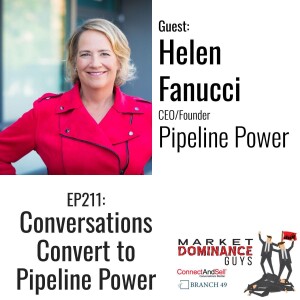
Wednesday Jan 24, 2024
EP211: Conversations Convert to Pipeline Power
Wednesday Jan 24, 2024
Wednesday Jan 24, 2024
As sales leaders, we're ultimately responsible for revenue growth. In part two of this must-listen episode, Helen Fanucci and Chris Beall reveal how to build an asset that drives results: pipeline power. Learn why phone and conversation intelligence beats guesswork. Discover how to arm your team with the right data to fill your pipeline with serious opportunities. We dive into the critical questions you must ask on every account to accelerate sales cycles. Helen emphasizes that trust builds between companies early on, so executives must engage alongside reps. Tune into part two for tangible tips on avoiding over-strategizing in favor of authentic conversations. You’ll pick up tactics to leverage intent signals, stop playing pipeline games, and create alignment around valuable targets. The key takeaway: with closed-loop feedback, your pipeline can become a core competitive advantage that speeds up cycles and boosts revenue.
Links from this episode:
Helen Fanucci on LinkedIn
Corey Frank on LinkedIn
Branch49
Chris Beall on LinkedIn
ConnectAndSell
FULL EPISODE TRANSCRIPT Below:
Corey Frank (00:01):
Chris, you've said many times marketing has budget, but no headcount. Sales has headcount, but oftentimes no budget. I would imagine certainly one of the things with pipeline power, Helen, in this consultancy and this advisory that you have on helping clients get more refined targeting to think about their targeting differently is about giving more power to the sales folks. And perhaps if you're talking to the marketing folks, giving more power to the marketing folks, how to allocate their budgets and allocate the resource probably a little bit more efficiently.
Helen Fanucci (00:38):
Yeah, I think so. But it also may be, it depends on the size of the organization, but I think there is a strategic, there needs to be a decider, if you will. Okay, this is the strategic decision, the direction we're going in because the targeting is a representation or a manifestation of the strategy of the business strategy. So that could be the head of sales, it could be marketing, it depends organizationally where that lands, or it might be the CEO if it's a smaller company, but it does absolutely point to a business strategy. Now, if you get more efficient with targeting and are able to do more with less, that could be threatening to some sales leaders who want to have a bigger organization headcount wise, or that might mean higher quotas. So it just depends on the dynamics and I think it's really going to take some iteration and conversations with some, if you will, friendly customers, friendly folks that I have relationships with to actually kind of see what that dynamic is and what the sweet spot is in terms of the offering as well as really the business challenge that these companies are looking to solve.
Helen Fanucci (01:59):
Because it may not be targeting, per se, I say targeting, but it actually may be market expansion. They want to test more markets. I mean, there's a lot of ways to apply that methodology and thought process. It could be, as I said, grow revenue fast here, get feedback, do more, or it could be okay, we want to expand and we want to try out some new markets. So it'll be interesting as I get more time and focus engaging with my potential market to see really what's resonating and what the core, I have an idea of the core challenges, but I think in some organizations it will be different titles that care and it will resonate with some folks and other folks it might not resonate with.
Corey Frank (02:54):
Well, I see Helen on this. There's a market maker to open up your aperture when you look at your total addressable market is right. How everybody's taught is total addressable market, and then you have your service addressable market, and then maybe even under that, you have your serviceable, attainable market, right? So if TAM is your total potential market demand and then you have your sam, which is the portion that a business can realistically target, and then the OMM service attainable market is the portion that your business can realistically capture. If you're helping me expand again or open up that aperture a little bit tot to grab folks that maybe I didn't have access before, it seems like that aperture opening is good for small mid-size companies, especially because I don't have, at Microsoft you probably had X amount of account managers walking through the halls. You had X amount of client amazement managers, so you could fill in the gaps where maybe I couldn't see if I'm a small mid-size company to know, oh, no, no, no. Hey, Helen does the same thing that Chris, but Chris has a different title than Helen and she's on LinkedIn and Chris doesn't believe in that and he's not on that. Would you see that Chris, from market dominance perspective is that that whole aperture gets a little bigger?
Chris Beall (04:17):
Yeah, I think it gets bigger and then you get to wrestle with the big factor in business, which is time. One of the huge differences among businesses is just how long can they go without eating? So just like among animals, right? Really big animals like me, I won't say anything about you who have had plenty to eat and are genetically engineered by nature to be of a certain size. We can go without eating for quite a little while.
Corey Frank (04:47):
At least an hour. At least an hour, yeah,
Chris Beall (04:50):
At least in my case, I've made it 37 minutes once and it was quite good. So a very small animal, it might have to eat once every hour or something like that. And I think a lot of what constitutes advice in sales and marketing go to market is advice that if you're the wrong size company and you take it, you die, you actually die of starvation. It becomes a pretty serious business actually. So one of the factors you have to take into account is kind of like how much do you have to kill and eat in the amount of time you have before you get skinny and die? And when you're opening that aperture, now that translates into how fast can you explore that new chunk of market you're thinking about before it takes too long, right? So now the cycle time of exploration is super, super important.
Chris Beall (05:42):
And if you believe that conversations of the means for exploration and frankly I don't know of any other that delivers enough highly reliable high fidelity information, then the cycle time to next conversation within somebody hypothetically is worth speaking to in that wider aperture becomes the dominant feature in the execution of your strategy, and that actually becomes the dominant feature. The feedback becomes the dominant feature in your actual strategy because having a strategy you can't execute is kind of ridiculous. And yet we all start out with strategies we can't execute. We must because we don't know enough to choose a strategy, we can't execute. So our strategy is a hypothesis. We need to go out and engage. It always reminds me of when I first met Helen, we went sailing together and there was a little piece of equipment that was on the mast and she knows sailing and I don't, she races sailboats and I serve as ballast, kind of animate ballast, right?
Chris Beall (06:42):
There's killer whales and you can't get them to come up on the boat and do the job, so you use me instead. So I noted that when she saw this piece of equipment that was very small and looked out of place that she ran, actually went physically fast toward the mass, then stopped and examined. That's what you need to do in markets. You need to go fast into a point where you're engaging, which is the conversation. She was having a conversation with this loose piece of equipment with her eyes and her MIT trained brain, her engineer's brain, and then she came up with a strategy. The strategy from where she was sitting in the back of the boat and the stern would've been a poor strategy because she didn't have enough information. She needed the information from engaging the market, this little piece of metal that was hanging there looking funny in order to be able to go, oh, this is what I'll do.
Chris Beall (07:36):
I can safely tuck it away and ignore it, or I can take some time and fix it or whatever. I think that's a great analogy for this kind of work that Helen is embarking on with pipeline power is look, you got to have somebody go run into the market and engage it and talk with it, not for the purpose of making a sale this quarter, but for the purpose of efficiently gathering information that will inform your strategies. You even know which of those three strategic layers with regard to Tam you're in. Because let me tell you, if you think you know, you're fooling yourself, you're fooling yourself. If you aren't getting feedback from the market through conversations at a short enough cycle time and a high enough frequency, you're just guessing and your problem is competitively, somebody else might choose not to guess. And I think Helen's going to help her clients choose not to guess.
Corey Frank (08:33):
And so with that, the helping knuckleheads like me choose not to guess. Where do you start, Helen, right? I'm a small mid-size VP of sales. I have a decent patient board. I have a SaaS software product. I got some funding. I think I'm doing everything right. I have enough people, I got for more people as soon as I start proving myself and go to the board. So I think I'm doing okay, but where would I start with something like this? With people power?
Helen Fanucci (09:05):
I would start by looking at the data that you currently have in your CRM system or whatever your system of record is to find out one, where you're winning, who you're winning with, what types of people are making the buying decisions as a business. You may or may not already know. That depends how you have been crawling through your own data. So I'd start there to look at the current state and try to draw some conclusions or at least illuminate where resources are aligned and are they aligned to where you're currently winning or are they misaligned? So I would start looking at the current state to build a hypothesis of what you could do more of to accelerate your revenue, and it might be repositioning some resources to an industry that you're doing well at or trying to then going to find people. Let's say you have some folks that make the decision, so you have some champions or economic buyers, what do they have in common across each other?
Helen Fanucci (10:24):
And I don't just mean job titles, but the characteristics. You can look on LinkedIn and see what the characteristics of those and then go find some more like that within a defined addressable market or where you think you want to go. I think some of those things are places to start. This begins to get the closed loop feedback here. You have data, you have some results and dispositions from your go-to market, even if it's closed loss or not now, not interested, what have you. So trying to apply current data to then make some recommendations of how to move forward. The other thing too is what information do you have or that you capture that's proprietary to you? Because can't build a defendable market dominance position on publicly available information. So what is it that you're collecting or that's proprietary and how do you get more of that that's relevant to your business? And I don't know if that's something in my experience anyway, that's not really a deliberate thing that people put. Time sort of happens and some people have more insights into their customer set, but doing that in an organized fashion to build up insights that your competitors don't have, or at least that's proprietary to you, makes a lot of sense and differentiating yourself and defending your position in the market.
Corey Frank (12:06):
Well, it also sounds like right Chris, defending, Hey, I got 4 0 9 a's that I have to do every year. If I can make an argument that I have some proprietary IP with regards to my cybersecurity database versus everybody else's, that could be an advantage from an acquisition or funding or valuation perspective. Could it not, Chris?
Chris Beall (12:31):
Oh yeah. I mean when you come right down to it, growth is the big driver of valuations and proprietary information is the big driver of growth. We actually, I think everybody knows that. It's like I want my really good reps out talking to people and learning what their needs are, proprietary information. That person told me what their needs are. I want to know when they're thinking of doing something. I want to know what other systems and processes we need to fit together with. I need to know who are the other people who are important in making a decision. I need to know if they're in a macro situation that tells me and tells them, Hey, we got to sit tight for a while, say in the middle of an m and a circumstance, but we think it'll be kind of done and integrated within three months, four months, five months, whatever.
Chris Beall (13:21):
All of that proprietary information that that's what is fundamental to being competitive. Your product features, your product capabilities are almost never going to be able to stand up to the market over time. Because if they're good people will copy them and they'll copy them. In fact, the innovator's dilemma tells us they will copy them with something that is cheaper than what you sell and not quite as good, but occupies a pretty big chunk of your addressable market. You're now obliged to defend from above, right? This is those who haven't read their professor, Clayton Christensen should grab their innovator's dilemma and reread it, and I would recommend rereading it twice actually, because most of us don't get it. When I read it the first time. It's interesting to me again, I told you, I just read a book over the holidays here about the second law of thermodynamics, which is about the second law is the one that says you can't break even.
Chris Beall (14:18):
You always lose. So the three laws are like, you can't win, you always lose and you can't get out of the game, right? Well, the one that says you always lose says things just get more disordered. Your job as a business is to create order by using energy up in the environment to do something. Well, what does that order? That order that lower entropy is in the form of information that allows you to go to the market more efficiently, talk to this person rather than this person. Have another conversation with this person in four weeks. Stay away from this person or this company because they don't have any need forever. Come back to these in a year because they will have need develop your product so it integrates with this product because that would give you access to this entire set of the market. All these things are driven by information that comes to you that creates order so that you don't dissolve into chaos, into entropy.
Chris Beall (15:14):
Like everything else in the universe, you're trying to fight against the tendency of the universe, which is to go crazy, to go disorder. The glass when it falls and breaks doesn't ever reassemble itself. Well, it's your job as a business to reassemble broken glasses or keep them from breaking. There's a lot of things that we can do. So what Helen is suggesting is one of the things we can do is let's pay attention to where we have a chance, but let's also find out if we have a chance that is let's make some good first decisions, hypothetical decisions as to where to go learn more, then let's go learn more, then let's make better decisions based on that information of where we should go learn more. Sales is actually a learning process primarily, and the exhaust of sales is deals and revenue.
Corey Frank (16:02):
That's great. Chris, you heard that one yet, Helen, from him. Sales process is predominantly a learning exercise and the exhaust and residue is revenue.
Helen Fanucci (16:14):
I think that that's not a compelling value proposition for a business, particularly when talking to sales leaders. They're accountable for revenue and yeah, okay, the learning thing, alright, maybe it's a more CEO executive conversation, but for most sales leaders, I don't think that's a winning proposition. That's just my opinion. I don't disagree with Chris, but I think there's probably a more elegant way to frame it that would resonate more with the audience.
Chris Beall (16:50):
I love that. Well, that's why I think most sales leaders last such a short amount of time in their jobs because they are held accountable for the quarter and maybe the next quarter, but the company is trying to do something over a longer period of time and you get this sort of mismatch. And so it's one of the big issues that we have now is it used to be salespeople. Were formally, informally responsible for nurturing their territory. We give you a territory. We don't expect you to leave the territory next quarter. We're actually thinking the longer you're in the territory, the more you're going to control the territory and the revenue you generate from the territory will become more predictable over time. That's kind of why we do it. You get Cory, you get Phoenix. Well, we don't know how big Phoenix is for us revenue wise, but we're pretty sure that if your butts on the line, your family's fortune's on the line and you're good, you're going to figure that out.
Chris Beall (17:44):
In a world where geography no longer dominates, territories become challenging. And now we've got to ask ourselves, well, so what are we really doing? And what we're really doing is we're saying sales, you've got a new problem. You've got to also nurture relationships over time. The old problem that you had when you had a territory, but now you have to do it with a lot less territorial clarity. And I think almost all conversations with sales leaders now are relatively uncomfortable for a whole bunch of reasons, including the macro economy, which doesn't help at all. They're held accountable for what happens when interest rates go up too. Interestingly enough, I actually agree with Helen. It's not a compelling value prop, but it's a fact of the world. And the fact is those who sell really, really well turn out to be those who learned the fastest and turn those learnings into compelling value for those that are ready to buy now and nurturing relationships with those who will be ready to buy later.
Corey Frank (18:49):
Well, and with what both of you have been saying, if it is indeed a learning exercise, and it may not be attractive to say that, hey, the residue is revenue, it also would yield the premise that the faster I can learn, the faster I can get to revenue, the more cycles I can put into that learning exercise. IE through nurturing, through cold calling, through understanding who my targets are out of the gate. It's measured three times, cut once and versus how a lot of organizations are. I give you all these tools. I'm going to bring in all the reps for outreach and SalesLoft and LinkedIn navigator. You're going to learn as a sales professional how to do it. But maybe my nature isn't to be a farmer. My nature isn't to be a nurturer. My nature maybe isn't to be a closer, my nature isn't to be a presenter, but I have an armed with all these tools.
Corey Frank (19:41):
I'm saddled with a number, a million and a half. I'll see you in 12 months. And that's usually where it ends. And the sales leaders are there to help support them, meaning let me know if you have a deal that has a couple of commas in it, because I'm going to come in and I'm going to help close that deal for you. But the tactical efforts are maybe probably geared around how your hygiene in Salesforce is. Maybe that's the majority of the tactical communication with the reps or in their all hands meetings. Correct. So it's interesting dilemma, but I'm looking forward to hearing more about pipeline power. And by the way, if you go to pipeline power.com, that's about offshore drilling rigs and things like that. Love it. That's not what we're talking about.
Helen Fanucci (20:22):
This is pipeline power ai. Thank you very much. ai. Although I don't think our website's up yet, so still working on that, but yeah, no, I saw that as well. I thought, oh, that's perfect. That means it's a completely different industry. No conflicts. I know this is pipeline power ai. By the way, Corey, your last statements there, the faster cycle time. This is why people who actually use the phone are going to win because they learn faster and leaders must work with their reps or understand how their reps are doing. You can't wait until there's a deal with multiple commas to go in and close it because it's already lost unless you're working with them earlier on because it is a team sport, and you've got to get executives engaged early on to have that trust building relationship. The company that's buying your product has to buy the trust of the company, not just the trust of the rep.
Helen Fanucci (21:24):
So there's a lot of leading indicators on territory planning, account planning, and I don't mean plan and put on the shelf, I mean plan as an inaction. Next steps, what are you doing? What's going on? What problems are we solving? What's the compelling event, et cetera. All the questions that you would know matter along the way. But yeah, so pipeline power is really about targeting and improving and using closed loop data. So as you learn, that goes into the model to improve better and better targeting so that the company can grow and accelerate revenues and valuation and exits or whatever the end game is for the customer's companies.
Corey Frank (22:13):
What I hear you saying is right, a page out of the book is love your team by arming your team. I think there's a recent LinkedIn post about that very thing, and so arm them the right
Helen Fanucci (22:24):
Way. Yes, we got arm your team along the way. Absolutely.
Corey Frank (22:27):
Well, wonderful. Well, Helen, thanks for coming, kicking and screaming to this episode of the Market Dominance guys, and glad you banished Chris to the corner of the house there where we normally get to opine and these weekly sessions. So Chris, final thoughts on love your team and on pipeline power and how it pertains to the market dominance mantra.
Chris Beall (22:49):
Well, market dominance is always about starting with a list because markets are lists, they're not ideas and getting that list to be sufficiently relevant that you can make hay while the sun shines, you can actually make some revenue off it. And then learning from those interactions quickly and make the list better and better. Sharper and sharper, more and more precise. That's the nature of the game. I love the name that Helen's chosen pipeline power. Your pipeline is power. Jeb Blunt says the pipe is life. And that's pretty true. I mean, the pipeline is the power of your company. When you look at your balance sheet and you ask what is the number one contributor to the biggest chunk of your balance sheet, which is called Goodwill, it's your pipeline.
Corey Frank (23:36):
That's so great and obviously valuations that we've talked about. So Helen, thank you once again for joining us. We hope to hear more and more as pipeline power learns more about this exhaust and residue that we've talked so much about in the industry. I think that no one is talking about this element of the tip of the spear as much, and I think the cycle times they're reduced, those are real compelling arguments to certainly engage with Helen and her team. So for the market dominance guys and Chris Beal, this is Corey Frank. Until next time.
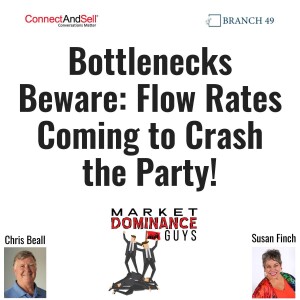
Wednesday Jul 19, 2023
EP188: Bottlenecks Beware: Flow Rates Coming to Crash the Party!
Wednesday Jul 19, 2023
Wednesday Jul 19, 2023
Chris unravels the enchanting world of manufacturing. Gone are the days of painstakingly crafting artifacts one by one, like our Stone Age ancestors. Now, we're immersed in the art of flow manufacturing, where tanks channel the flow of chemicals, and even discreet manufacturing dances to the rhythm of flow. It's a symphony of efficiency where our sales teams manufacture opportunities, creating the invaluable currency of option value.
Chris urges us to view our sales organizations as factories where identifying bottlenecks and maximizing flow rates are the keys to success. In this world, conversion rates become the icing on the cake, but only after we've mastered the flow.
Finally, Chris challenges the age-old debate of quality versus quantity and reminds us that we're left with nothing without quantity. Join us for this episode, "Bottlenecks Beware: Flow Rates Coming to Crash the Party!"
Links from this episode:
Corey Frank on LinkedInChris Beall on LinkedIn
Branch 49ConnectAndSell
Full episode transcript below:
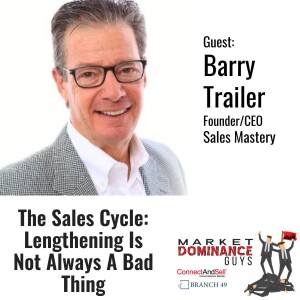
Wednesday Jan 25, 2023
EP166: The Sales Cycle: Lengthening is Not Always a Bad Thing
Wednesday Jan 25, 2023
Wednesday Jan 25, 2023
In part two of this series, Barry Trailer, Chris and Corey bring a touch of humor to the conversation on the topic of sales and how it relates to the corporate business world today. Barry emphasizes the importance of establishing and elevating relationships over time, stating that sales isn't about predicting anything but rather bringing people together. He compares the unpredictability of sales to the unpredictability of a baseball game, where even the best players are out 70% of the time. Chris Beall adds that the desire for predictability is a universal human desire, but sales is about doing things that have a reasonable shot of bringing people together so that problems can be solved that would otherwise be left unsolved. There is even a reference to fortune tellers, who are able to convince people to believe in the impossible. They guys agree that while the game of sales has not changed, the tools available to do it have improved, and the ability to access and share information has greatly increased, making sales performance level much higher today than in the past.
If you haven't listened to the first half of this series, we highly recommend you to check it out, "The Scarcest Commodity in Corporate Business Today.”
Full episode transcript below:
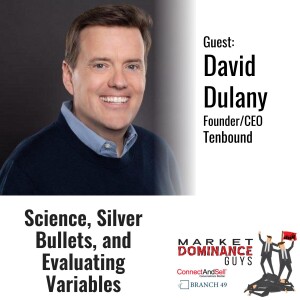
Wednesday Dec 28, 2022
EP162: Science, Silver Bullets and Evaluating Variables
Wednesday Dec 28, 2022
Wednesday Dec 28, 2022
Scientific methods have a place in sales, whether it is to keep existing customers happy or to continue building the pipeline. David Dulany of Tenbound says, “You create a hypothesis of what your messaging is going to be, and then you run an experiment on it and report on the results of the methodology that you're using, do a little bit more research, change it up, make a new hypothesis, and run the same structure over and over again basically for the rest of your life.” Unless you are willing to reevaluate what is working and what is not continuously, it will all stop working, and static growth or loss of business is inevitable. Chris, Corey, and David have solutions for you. They suggest you look at the efficiency of the people, the processes, and the current technology you currently have in place. Many of these companies have a tech stack, and they don't optimize it and look at it from the perspective of setting it up correctly to really be able to get all the juice out of it. Evaluate the value of what's on hand versus coming up with some new silver bullet that will solve everything. Listen to this episode of Market Dominance Guys, “Science, Silver Bullets and Evaluating Variables.
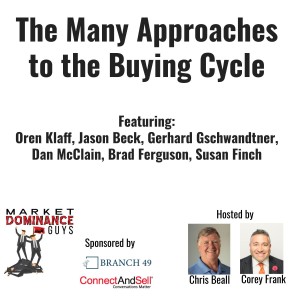
Wednesday Aug 17, 2022
EP144: The Many Approaches to the Buying Cycle
Wednesday Aug 17, 2022
Wednesday Aug 17, 2022
These sales experts agree, that there is more than one approach to a successful sales campaign. We're sure Chris Beall has some dark childhood story about alternate ways of skinning a cat, although he's never done it, of course. These discussions include modifications and redirections in the buying cycle, even though the basics are still there: awareness, consideration and decision. Join Corey and Chris in this episode of snippets from episodes about the buying cycle. This features Oren Klaff, Jason Beck, Gerhard Gschwandtner, Susan Finch, Dan McClain, Brad Ferguson, and our own Chris Beall and Corey Frank. To hear the entire episodes features, visit this collection:
https://marketdominanceguys.com/category/buying-cycle/
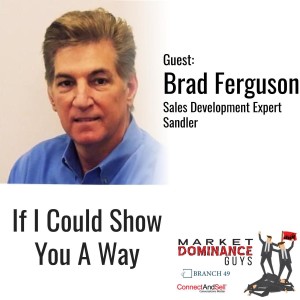
Wednesday Jul 27, 2022
EP141: If I Could Show You a Way
Wednesday Jul 27, 2022
Wednesday Jul 27, 2022
In this continued “honeymoon” edition of the Market Dominance Guys, our host, Corey Frank, sits down with Brad Ferguson of Sandler Training, one of the most highly rated sales trainers on the planet. Brad, being a top franchisee of Sandler for years, personally learned his incredible questioning techniques and prospect approaches from the founder of Sandler himself, David Sandler, more than 30 years ago.
On several of the Market Dominance Guys' podcasts over the years, Chris Beall and Corey have discussed many of the modern and fresh sales methodologies being used by successful sales professionals all over the world. From Oren Klaff’s “Pitch Anything” to Andy Paul’s “Sell Without Selling Out” to Chris Voss’ “Never Split The Difference,” there are many different flavors of sales methodologies that can be used to generate trust that result in more consistent sales success.
If you’re a pilot, you file a solid flight plan and know where you are going before you start the engines. You may change course due to bumpy weather, but you still know your final destination. If you are an architect, you know what type of building you are constructing. You have a blueprint. But if you are in sales today and you are still “winging it” and letting your personality alone dictate how your sales conversations progress, you fall into the trap of being labeled a “mere tourist” and continuing to wander inconsistently in this profession. As Uncle Zig once said, “Selling is the highest-paid hard work and the lowest-paid easy work there is.” Using a sales methodology makes the hard work easier.
In this episode, have your pen and pad ready as Brad shares several tactical and specific use cases where the Sandler methodology can be employed on your calls today. He discusses many traditional “mental hang-ups” and speed bumps that impede success from an emotional point of view. From being uncomfortable about money to having a high need for approval and an aversion to the word “no,” Brad shares just some of the powerful Sandler techniques that have generated hundreds of millions of dollars in closed deals. This is the Market Dominance Guys' nearly indispensable podcast, and today’s episode is entitled, “If I Could Show You a Way.”
About Our GuestBrad Ferguson is the CEO of Best Sales Force, Inc., an Arizona-based sales development firm. Heis the Senior Sandler Training Franchisee with over 25 years of experience in the SandlerNetwork.
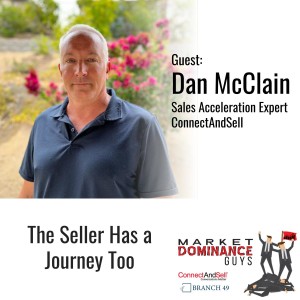
Tuesday May 17, 2022
EP132: The Seller Has a Journey Too
Tuesday May 17, 2022
Tuesday May 17, 2022
You’re no doubt familiar with the buyer’s journey, but what do you know about the seller’s journey? Dan McClain, Sales Director at ConnectAndSell and today’s guest on Market Dominance Guys, shares his personal journey as a salesperson with our host Chris Beall in this first of a two-part conversation. Starting at the beginning of his career, Dan tells the story of how he got into sales straight out of college, what his early selling experiences were like, and how he cold-called his way to where he is today. Most memorable for him was his first experience using ConnectAndSell Lightning, the cold-calling tool that boosts the number of conversations a salesperson can have with prospects. Pushing that “Go” button and being served one conversation after another changed his life and led to his current job selling Lightning at ConnectAndSell. Helping other salespeople discover this tool is now Dan’s mission. Listen in as Dan and Chris remember the details of their first meeting in today’s Market Dominance Guys’ episode, “The Seller Has a Journey Too.”
About Our Guest
Dan McClain is Sales Director at ConnectAndSell. His life-long dedication to sales has led him to his current goal: helping sales leaders, teams, and individuals connect with their targets at a velocity of 10X by using ConnectAndSell Lightning. Dan is based in the San Diego area and is active in his local chapter of AA-ISP.
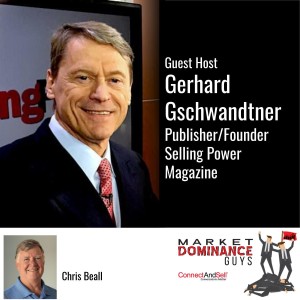
Tuesday Jan 11, 2022
EP116: Who’s Ready to Buy Right Now?
Tuesday Jan 11, 2022
Tuesday Jan 11, 2022
When your prospect’s response to your cold call is “Not now,” do you assume they mean they’re too busy to talk at that moment? Or perhaps this is just their way of getting rid of you altogether. Our Market Dominance Guy, Chris Beall, talks with Gerhard Gschwandtner, CEO and founder of Selling Power, in this podcast about a more probable reason you’re hearing “Not now.” It has to do with the replacement cycle and consideration cycle of businesses. In other words, where they are in the three-year buying cycle most businesses utilize for timing when they begin considering a new product or service — or replacing an existing one. Once you determine if “Not now” really means “We’re not ready to purchase at this time,” what you do next is critical! Listen in as Chris and Gerhard divulge the intelligent way to deal with the 11/12ths of the market who aren’t ready to buy at this time. Take my word for it: You won’t want to miss the market-dominating advice you’ll hear on this Market Dominance Guys’ episode, “Who’s Ready to Buy Right Now?”
About Our Guest HostGerhard Gschwandtner is founder and CEO of Selling Power magazine, as well as CEO of the Sales 3.0 Conference series. Gerhard’s career has always been centered around helping sales leaders create peak performance in business and in life through video interviews, online events, and live workshops and retreats.
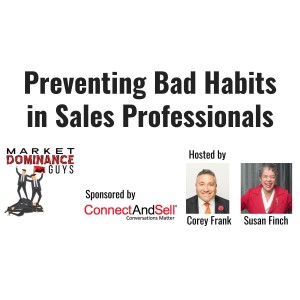
Tuesday Aug 17, 2021
EP95: Not Getting Trained? Train Yourself.
Tuesday Aug 17, 2021
Tuesday Aug 17, 2021
How do you improve your cold calling skills if your present company isn’t providing any sales training? Train yourself! Until you can get with the right company, borrow ideas from the best sales experts you can find (many have been guests on this podcast), take improv classes, join Toastmasters, and keep your mind open to absorb what works. Our Market Dominance Guy Corey Frank is talking in more depth about training yourself during this second part of his conversation with Susan Finch, president of Funnel Media and Funnel Radio. He advises listeners that salespeople should fall in love with their craft — not the product they’re selling. How do you do that? Care about the potential value of the meeting for your prospect and remember the “why” of what you’re doing. And what skills should you hone? Learn what moves prospects to make a decision, create a well-written script and adhere exactly to it, use the tone of voice that elicits the response you want, and most importantly, leave your own mood and ego behind when you make a cold call. Train yourself to remember that it’s not about you. When you place a call, it’s showtime!
Listen to the first half of this interview here:
Are You Laying Brick, or Making $12 an Hour?
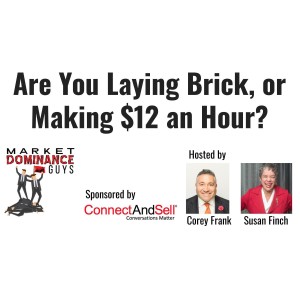
Wednesday Aug 11, 2021
EP94: Are You Laying Brick, or Making $12 an Hour?
Wednesday Aug 11, 2021
Wednesday Aug 11, 2021
What good is a salesperson with five years' experience if they've never been trained and have a hopscotch career of many short stops at companies that never invested in training their sales teams? Corey tells the old story, "A guy walks past a construction site and sees five people laying brick. And he goes to the first guy and says, "Hey, what are you doing?" He's like, "Building a wall." Goes to the second guy, "What are you doing?" And he's like, "Making 12 bucks an hour." Listen to the rest as Corey Frank and Susan Finch, president of Funnel Media Group and Funnel Radio, go on without Chris Beall this week and talk about the concept behind Branch49, a sales acceleration software and service that uses AI to score leads based on their preferred contact channels, while also dedicating a sales team to perform top-of-funnel and full-stack revenue generation. They discuss the obligation that companies have to ensure sales professionals are trained correctly and with the good of the prospect and customer at the forefront, how to undo bad sales habits, and how to help sales professionals who were never trained prepare to work for honorable companies who value sales skills. This is part one of a two-part interview.
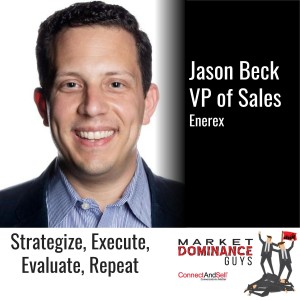
Wednesday Jan 27, 2021
EP66: Strategize, Execute, Evaluate, Repeat
Wednesday Jan 27, 2021
Wednesday Jan 27, 2021
On today’s episode of the Market Dominance Guys, Chris and Corey continue their conversation with Jason Beck, Vice President of Sales at Enerex, by addressing how sales got a dirty name. Chris explains that in ancient times, the salesman met the buyer face to face, but the encounter was usually a one-time transaction. Then, the camel caravan moved on, and if the buyer wasn’t happy with his purchase, there was no one to appeal to for a replacement and no one to lodge a customer complaint with. Ancient sales was a hit-and-run relationship that frequently left a bad taste in the buyer’s mouth about salesmen. But in modern times, the sale is never over, because the telephone and the internet have created an ongoing relationship between sellers and buyers. The modern salesperson needs to understand that you can run, but you can’t hide, which makes it imperative that reps provide value to their customers.
Jason and the Market Dominance Guys segue into a discussion of what type of personalities are best suited to be salespeople and what types should definitely NOT hold this job. The attributes of being pro-active and persistent are touted, as well as the importance of being in sales for the right reasons. As Jason puts it, “If closing the deal at the end of the day isn’t what you live for, then don’t be in sales.”
This team of sales-savvy guys wraps things up with a discussion of the cycle of the sales process for a new product and why it works — as this podcast’s title says — to Strategize, Execute, Evaluate, and Repeat.

Wednesday Dec 09, 2020
EP60: Diagnosing Discovery Call Failures
Wednesday Dec 09, 2020
Wednesday Dec 09, 2020
In this episode of Market Dominance Guys, we’ll dissect that sales process called the “discovery call” and diagnose the problem that is keeping sales reps from making a successful one. Chris, Corey, and Oren Klaff, managing director of Intersection Capital, share their opinions on the subject, and lament the unfortunate fact that most sales reps have no set method for conducting a discovery call that includes true discovery.
As Oren describes it, “Selling is a bit icky, and [salespeople] want to retreat quickly back to the relative calm of their normal lives. Once a salesperson hears one thing [from the prospect] that’s an indicator of interest, they want to hit the buzzer” and immediately jump to the sales pitch so they can end their own discomfort. As Oren sees it, this cut-to-the-chase method is the primary reason many discovery calls fail. Instead of truly finding out what problems the prospect or his company might have, which the product being offered might solve, reps skip right over the creation of a relationship that might help them eventually make that sale. Chris is convinced that salespeople can actually be coached on where they went wrong during a discovery call and how to do it in a way that works. In this podcast, you can listen to the two questions that Chris begins his own discovery calls with — and then find out what the heck “the dog, the meat, and the chain-link fence” have to do with this subject. Who knew that a discussion about discovery calls could be so insightful and entertaining?
If you missed the first half of this conversation, you can get it here:
https://marketdominanceguys.com/e/getting-prospects-from-fear-to-commitment/
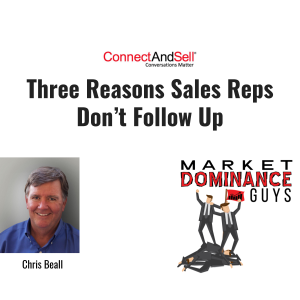
Tuesday Apr 07, 2020
EP25: Three Reasons Sales Reps Don‘t Follow Up
Tuesday Apr 07, 2020
Tuesday Apr 07, 2020
In this episode of the Market Dominance Guys, Chris Beall talks with ConnectAndSell's Customer Success Manager, Donny Crawford drilling it down to the three reasons Sales Teams don't follow up. When we hire people to sell for us, whether it's to sell meetings or whether it's to sell deals, we tend to put them under a compensation regime that emphasizes this quarter. Need happens at this moment to match up with what you can provide. And in order to determine their need, you have to have a discovery conversation with them. And until you have a discovery conversation, you don't actually know whether they need your offering at all much.
As we know that mounts the pressure to meet numbers of calls but doesn't usually accomplish closing more deals. Learn how yes, no, not now affects our emotion tied to rejection and perception of rejection - the ability to keep our emotions in check. This is part one of a two-part session.

Monday Dec 30, 2019
EP15: All Dead Companies are Equally Uninteresting.
Monday Dec 30, 2019
Monday Dec 30, 2019
The classic book, Crossing the Chasm, by Geoffrey Moore, is a manifesto, a field manual, and sales’ version of Dr. Spock’s book on “company rearing” for new entrepreneurs…all in one. To level set for a brief moment – and Googling an image of Dr. Moore’s chasm graph may be helpful for the episode here - marketers have traditionally identified different kinds of B2B tech buyers: Innovators, Early Adopters, Early Majority, Late Majority, and finally the Laggards.
The traditional model assumed that, in the lifespan of a product, the market is first dominated by the innovators, then the early adopters etc. down the line. This model implies a level of inevitability in the flow-through of one of these categories from another to another…as your business continues. Good in theory but not so easy in practice.
The reality of entering and competing for markets today, gaps exist between the categories in this model that are large enough to derail the most promising startups as they transition from one category of customers to the next.
And the biggest gap Moore writes about is the one between Early Adopters and Early Majority. This is where both bags of money and companies go to die. Because the GoTo market & sales strategies that win deals in the Early Adopters group, won’t necessarily work so well for the Early Majority group. Instead, you may find yourself at the bottom of a valley looking up at an el Capitan-like sheer vertical wall of market climbing ahead of you. The sales team by your side that did well in the early stage of capturing innovators and early adopters now find themselves often overmatched and underequipped by the challenge and technical nuances of a market wall this big.
Since it is vastly different market types, moving from early adopters to early majority requires new tools, new approaches, and a lot of new thinking.
So what is the new thinking? In this episode, I ask Chris about the simple differences in the type of team and skills and techniques you need to climb this wall and continue moving down Moore’s market path. Building trust is the core requirement – and without understanding how and why you need to manufacture it to scale this wall, you’ll be left floundering and eking for survival with other amateur but well-intentioned climbers at the lower reaches of this meager market wall. So once again welcome to the Market Dominance Guys and this week’s episode, “All dead companies are equally uninteresting.”
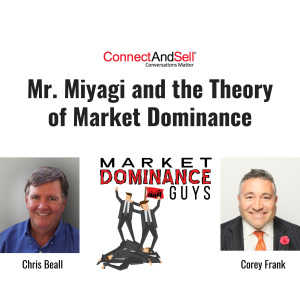
Wednesday Dec 04, 2019
EP13: Mr. Miyagi and the Theory of Market Dominance.
Wednesday Dec 04, 2019
Wednesday Dec 04, 2019
Rocky. The Karate Kid. The Average Joes. Rudy. Underdogs. We love them. They are the people who use their grit combined with their well-coached and newly acquired skills to make waves, cause the odds-makers fits, and run up the score.
When you get funded by a VC and finally have the green light to release the Kraken and launch your vaunted sales machine, there is a temptation to run up the bill on the countless tools available in the sales and marketing stack and forget the meager stack from whence you came.
“Stand back…I have capital and I’m not afraid to use it!”...you’ll think.
Magic beans to make my phone ring?...I’ll take it!
A love potion to make my prospects swoon into a demo?...Yes, please!
A virtual dancing Elvis to get folks to download my white paper?...sure, why not?
You can spend the GDP of a small Caribbean country playing this game and feeling like you also have the perfect Millennial-friendly office, the best cold brew, and the ideal dress code and PTO policy.
But the most sophisticated and successful stack and culture in the world can be had right now if you simply have a tight message that works combined with a mechanism to talk to hundreds of thousands of people a year…AND doing it with a small team of sincere and empathetic salespeople.
But is it realistic?
In this episode I ask Chris if something like this only exists in the lab…or can it be really be seen in the wild.
Welcome to the Market Dominance Guys and this week’s episode: “Mr. Miyagi and the Theory of Market Dominance.”
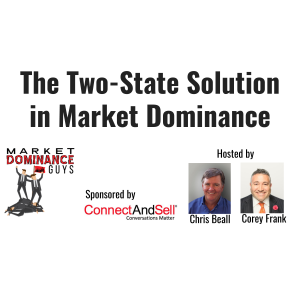
Friday Nov 15, 2019
EP11: The Two-State Solution in Market Dominance: Dollars or Donuts?
Friday Nov 15, 2019
Friday Nov 15, 2019
States, lots of ‘em, 50 states. Plus Red States, Blue States. States of consciousness. Physical states. Liquid/Gas…
How about the state of Markets, being Market Dominant, or simply being an “also-ran?”
The fact is there are only two states you can reside in as a company: you're either dominating one market or more, or you're dominating zero. And if you're dominating zero markets, you WILL go out of business in time unless you turn into a company that IS dominating at least one market.
Market Dominance is security, it’s collateral, safety, shelter, asylum, parlay; but most importantly, it’s freedom. Because the only two reasons a company dominating a market can ever go out of business is either financial mismanagement or if the market is just too small.
So how do you map your journey to market dominance? What’s changed over the past few years that makes it easier for some and more difficult for others to even get out of the gates? In this chat, I ask Chris for his insights into the real stakes of entering this Octagon of business without true dominating intent. This is the Market Dominance Guys and today’s episode entitled, “The Two-State Solution in Market Dominance: Dollars or Donuts?”